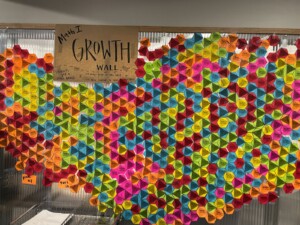Mastery Week: 13 Resources for Assessment in CBE Environments

Competency-based education (CBE, often also called mastery-based education) systems—those in which students “move on when ready” rather than “when the calendar or grade level says it’s time to”—hold the potential to create learning that is truly personalized and equitable for all students. By focusing on providing each student with the support they need, when they need it, to progress to their next step—whatever that step may be for them—our education system could better support more students in reaching their full potential.
However, we collectively still have a ways to go before this can become a reality—new forms of transcripts, new edtech tools, and new approaches and priorities for guidance are needed before many schools, districts and states will be able to face these challenges. On top of these logistical challenges lie many conceptual ones. What competencies should be prioritized? How can schools pressed for resources make this big shift effectively? What cultural aspects should leaders prioritize?
One fundamental question often at the front of this discussion is how to actually assess learning in competency-based environments. There has to be a way, but how? What measures and outcomes should be prioritized? What tools exist to measure them? This year, Springpoint’s annual Mastery Week focused on assessment, and the community came together to share out some great resources. Here, as a send off, we’ve compiled some new ones we’ve come across through Mastery Week, as well as some that we’ve seen around (or released ourselves) in the past that you may not have seen.
Resources for CBE Assessment
Buck Institute for Education Rubrics. BIE’s collection of rubrics are primarily targeted at PBL, but can provide some great food for thought in terms of thinking through the more nebulous aspects of measuring and tracking learning pathways when “traditional test scores” might not get the job done.
Building 21’s Learning What Matters Competency Framework. Building 21, a small new CBE network of schools (see Co-Founder Chip Linehan’s explanation of their approach), developed this framework with the Philadelphia school district. The framework includes competency maps and progressions that can serve as inspiration when thinking through assessments.
Mastery Week 2018: Two Best Practices for Crafting Mastery Assessments. This blog post, part of Mastery Week, highlighting two of reDesign’s main strategies for developing performance assessment in CBE environments: designing a common task frame aligned to a key competency, and beginning with the design of an engaging and relevant problem frame.
The “Show Me” Grading System of the Future. How do you report and assess on this kind of learning? What grade should individual students receive? Do students all receive a cumulative mark? Where is the place on the report card for the invaluable skills they gained in the process? Here, Getting Smart Columnist Kyle Wagner describes 5 steps to developing assessment of experiential learning.
How do you Design a System of Assessment in a Mastery-based Environment? This tool from 2Revolutions released during Mastery Week addresses many of the tricky questions, and can be used by an educator or a team to begin to develop a system for assessing mastery.
Helpful Tools for Providing Effective Competency-Based Education. This blog post highlights some of the best CBE-capable edtech in the areas of learning platforms/learning management systems, curriculum resources, and assessment/reporting.
ImBlaze: Igniting Powerful Real-World Learning Experiences. Getting Smart Columnist Erin Gohl here discusses Big Picture Learning’s internship and real-world learning LMS. “ImBlaze has made it possible for other schools to take internships to scale without increasing the burden,” she says. “The system empowers all parties to assess the quality and overall impact of individual internship and mentor experience, aggregate responses by participant descriptors, and enable analytics across placements and years.”
Guidelines for Assessment of Place-Based Learning. Place-based ed shares many characteristics with CBE, but places a special emphasis on connection to local environments and communities. Here, Gillian Judson shares 8 guidelines for developing assessment in place-based education.
Thought Pieces and Case Studies
A New Model of Student Assessment for the 21st Century. This case study from American Youth Policy Forum challenges long-established practices and offers districts possibilities for improving secondary education outcomes by rethinking their understanding of academic success and transforming the structure and tracking of student achievement. “Hundred-year-old structural mechanisms designed to draw academic distinctions among students have become powerful structural barriers to academic achievement for a significant number of students in today’s urban high schools,” the brief argues.
The Future of Testing. Our current model of testing persists precisely because it so effectively delivers on machine-age promises of reliability and efficiency at a large scale. But these benefits come at a cost: the fixed content and rigid testing conditions severely constrain the skills and knowledge that can be assessed. Here, Getting Smart Columnist William Bryant looks at how those dynamics could change.
The Role of Assessment in a Learning Culture. This paper explores “the type of assessment that can be used as a part of instruction to support and enhance learning.”
Creating Systems of Assessment for Deeper Learning. “New systems of curriculum, assessment, and accountability will be needed to ensure that students are given the opportunities to learn what they need to be truly ready to succeed in college and careers,” argues this report from the Stanford Center for Opportunity Policy in Education. The report explores systems and structures that support assessment of deeper learning and broader competencies than those traditionally measured in academics.
Evidence That Makes it Evident: Improving Assessment by Emulating the Trades. Elliot Washor and Chaz Mojkowski of Big Picture Learning share insights into their process for designing high-quality assessment metrics and processes based on real-world competency-based environments.
We’ve got a lot to digest after this week of learning about mastery assessment, and will be looking forward to joining again next year to continue learning from—and sharing with—the Mastery Week community.
And for more general competency-based education resources, see:
- Rethinking the High School Credential
- Show What You Know: The Shift to Competency
- How Better Transcripts Will Improve College Admissions, Employment, and Licensing
Stay in-the-know with all things edtech and innovations in learning by signing up to receive the weekly Smart Update. This post includes mentions of a Getting Smart partner. For a full list of partners, affiliate organizations and all other disclosures, please see our Partner page.






0 Comments
Leave a Comment
Your email address will not be published. All fields are required.